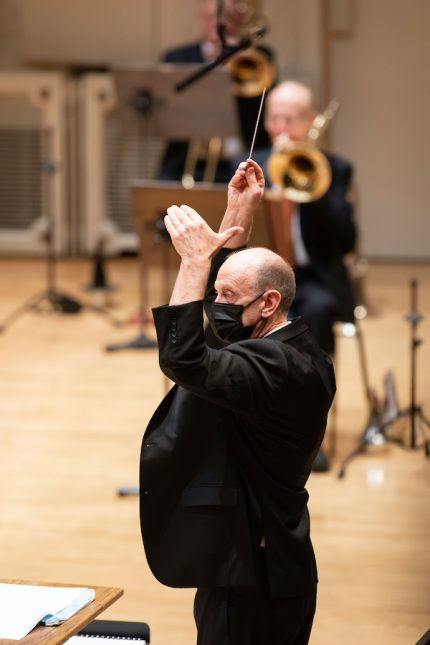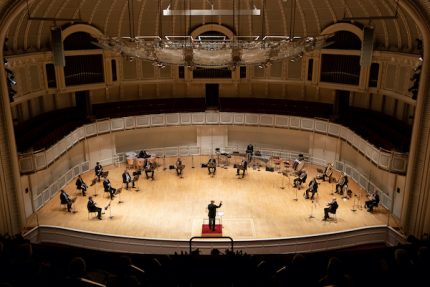The Chicago Symphony Orchestra makes a bold and brassy return

Fanfare for the Common Man has rarely sounded more majestic or apt for an occasion.
Aaron Copland’s rousing fanfare launched Thursday night’s concert by the Chicago Symphony Orchestra brass and percussion—the first public performance on the Orchestra Hall stage in one year and nearly three months since the Covid-19 pandemic shuttered theaters and concert venues in Chicago and around the world.
It was clear that this was not the usual CSO Thursday night subscription program. The concert ran just one hour with no interval. In addition to the fewer musicians onstage, all audience members were masked, as required, and social distancing strictures limited attendance to 398—less than 20 percent of Symphony Center’s usual capacity.
But both audience members and musicians seemed genuinely thrilled to be in each other’s company again after the Covid-induced hiatus. Following brief speeches by CSOA president Jeff Alexander, CSO hornist and player committee rep James Smelser, and board chair Helen Zell, the musicians entered the stage to a prolonged standing ovation.
An annual event, the CSO’s Brass and Percussion Program fell victim last year to the coronavirus yet with its reduced forces proved ideal for the orchestra’s spring reawakening. The CSO’s dozen brass players, timpanist and three percussionists—joined by seven non-roster musicians as needed—were arranged in a widely spaced semicircle and conducted by CSO trombonist Michael Mulcahy.
Launched with thunderous bass drum and timpani attacks, Copland’s curtain-raiser pinned one’s ears back in a powerful opener to the evening. There was a trumpet slip in the fanfare and fleeting blemishes elsewhere but the playing was largely as gleaming, virtuosic and exhilarating as one would expect from these musicians—especially coming off the longest interruption in the orchestra’s 130-year history.

It was also laudable to have a program devoted entirely to American music, which is still too much of a rarity in the orchestra’s current era.
Samuel Barber wrote few large works in his depressive final decade. (The beautiful Canzonetta from an uncompleted Oboe Concerto is a tantalizing reminder of what might have been.) Barber’s Mutations from Bach is typical of these late fragments, working a somber plainchant and Bach theme into a tightly woven set of variations. Aided by a nobly expressive horn solo by principal David Cooper, Mulcahy led a poised performance that brought out the somber eloquence of Barber’s five-minute miniature.
Though better known as a conductor than a composer, Michael Tilson Thomas has written several works in recent decades. None has proven more popular than his Street Song, written in 1988 and heard here in MTT’s later expansion to 13 brass players.
Street Song comprises three sections played without interruption, which draw on a trio of main themes or “songs.” The first is jumpy and somewhat agitated, and the third imbued with dance-like exuberance. Most striking is the middle theme, first heard in the horn, which has a kind of seaside, lonely-lighthouse expression.
Mulcahy’s direction was largely alert and solid throughout the varied program. But in Street Song the pacing seemed off and the piece felt sectionalized, trudging doggedly from one episode to the next. Part of the issue is that Street Song feels undeniably bloated in its symphonic brass guise. The work’s restless quirkiness and unpretentious lyric charm are heard to better effect in the more intimate original version for brass quintet.
Renown for his “third wave” melding of jazz and classical elements, Gunther Schuller was a prolific composer, albeit writing in a style that often falls into well-crafted note-spinning and a kind of thematic grayness.
Not so Schuller’s Symphony for Brass and Percussion, one of the composer’s most successful inspirations. The largest work of the short evening, Schuller’s symphony is cast in four movements and mines a remarkable range of timbral coloring and instrumental combinations. Perhaps the Vivace movement was a bit heavy-footed but for the most part Mulcahy’s conducting was inspired, clarifying the often thick textures and consistently bringing out the ingenuity and resourcefulness of Schuller’s scoring. Superb playing by all sections—not least in the chromatic high velocity of the finale—with strong contributions from timpanist David Herbert.
Leonard Bernstein’s music for On the Waterfront was his sole venture into writing a film score. Bernstein’s score is magnificent and his driving, jazz-inflected music perfectly suits the tale of violence and union corruption on the New York docks. Yet effective as it is, Bernstein was unhappy with the inevitable editing of his score to match the action and lived up to his vow never to compose for Hollywood again. Bernstein later reworked his score—including music not used in the film—into his Symphonic Suite from On the Waterfront, one of his finest concert works.
The program concluded with the Presto barbaro section of the Suite, as retooled in Frank Erickson’s version for brass and percussion. With large brass contingent, amplified piano, and two sets of timpani a la Mahler 1—Bernstein’s angular, hard-charging music made massive sonorous impact.
Following the enthusiastic ovations, Mulcahy said a few apt words about how grateful he and his colleagues are to be back performing before the CSO audience again. He noted one person was not there and ended the evening with a coyly introduced “surprise” encore: Timothy Higgins’ clever, boisterous arrangement of Happy Birthday for Riccardo Muti’s July natal observance.
The program will be repeated 7:30 p.m. Saturday and 3 p.m. Sunday. cso.org; 312-294-3000.